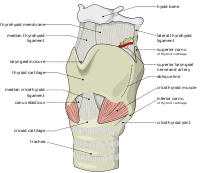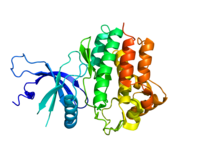
COX6A2 variants cause a muscle‐specific cytochrome c oxidase deficiency
Sign Up to like & getrecommendations! Published in 2019 at "Annals of Neurology"
DOI: 10.1002/ana.25517
Abstract: Cytochrome c oxidase (COX) deficiency is a major mitochondrial respiratory chain defect that has vast genetic and phenotypic heterogeneity. This study aims to identify novel causative genes of COX deficiency with only striated muscle–specific symptoms. read more here.
Keywords: cytochrome oxidase; deficiency; muscle specific; cox6a2 variants ... See more keywords

Muscle‐specific Perilipin2 down‐regulation affects lipid metabolism and induces myofiber hypertrophy
Sign Up to like & getrecommendations! Published in 2019 at "Journal of Cachexia, Sarcopenia and Muscle"
DOI: 10.1002/jcsm.12355
Abstract: Perilipin2 (Plin2) belongs to a family of five highly conserved proteins, known for their role in lipid storage. Recent data indicate that Plin2 has an important function in cell metabolism and is involved in several… read more here.
Keywords: metabolism; muscle; plin2; specific perilipin2 ... See more keywords

Muscle‐specific deletion of SOCS3 does not reduce the anabolic response to leucine in a mouse model of acute inflammation
Sign Up to like & getrecommendations! Published in 2017 at "Cytokine"
DOI: 10.1016/j.cyto.2017.05.016
Abstract: HighlightsSOCS3 deletion in skeletal muscle does not alter LPS‐induced inflammation.SOCS3 does not mediate the anabolic response to leucine in skeletal muscle.Leucine augments the LPS‐induced expression of IL‐6 and STAT3 phosphorylation. Abstract Excessive inflammation reduces skeletal… read more here.
Keywords: socs3; response; muscle; deletion ... See more keywords

Short-term inhibition of autophagy benefits pancreatic β-cells by augmenting ether lipids and peroxisomal function, and by countering depletion of n-3 polyunsaturated fatty acids after fat-feeding.
Sign Up to like & getrecommendations! Published in 2020 at "Molecular metabolism"
DOI: 10.1016/j.molmet.2020.101028
Abstract: OBJECTIVE Current evidence for AMPK-mediated regulation of skeletal muscle metabolism during exercise is mainly based on transgenic mouse models with chronic (lifelong) disruption of AMPK function. Findings based on such models are potentially biased by… read more here.
Keywords: muscle; ampk; mice; muscle specific ... See more keywords

Corrigendum: Muscle-specific CRISPR/Cas9 dystrophin gene editing ameliorates pathophysiology in a mouse model for Duchenne muscular dystrophy
Sign Up to like & getrecommendations! Published in 2017 at "Nature Communications"
DOI: 10.1038/ncomms16007
Abstract: This corrects the article DOI: 10.1038/ncomms14454. read more here.
Keywords: crispr cas9; corrigendum muscle; muscle specific; dystrophin gene ... See more keywords

Muscle-specific downregulation of GR levels inhibits adipogenesis in porcine intramuscular adipocyte tissue
Sign Up to like & getrecommendations! Published in 2017 at "Scientific Reports"
DOI: 10.1038/s41598-017-00615-9
Abstract: Intramuscular adipose is conducive to good pork quality, whereas subcutaneous adipose is considered as waste in pig production. So uncovering the regulation differences between these two adiposes is helpful to tissue-specific control of fat deposition.… read more here.
Keywords: downregulation levels; levels inhibits; muscle; tissue ... See more keywords

Passive transfer models of myasthenia gravis with muscle‐specific kinase antibodies
Sign Up to like & getrecommendations! Published in 2018 at "Annals of the New York Academy of Sciences"
DOI: 10.1111/nyas.13543
Abstract: Myasthenia gravis (MG) with antibodies to muscle‐specific kinase (MuSK) is characterized by fluctuating fatigable weakness. In MuSK MG, involvement of bulbar muscles, neck, and shoulder and respiratory weakness are more prominent than in acetylcholine receptor… read more here.
Keywords: specific kinase; passive transfer; myasthenia gravis; muscle specific ... See more keywords

Vector‐mediated expression of muscle specific kinase restores specific force to muscles in the mdx mouse model of Duchenne muscular dystrophy
Sign Up to like & getrecommendations! Published in 2021 at "Experimental Physiology"
DOI: 10.1113/ep089439
Abstract: What is the central question of this study? The (dystrophin‐deficient) muscles of mdx mice generate less contractile force per cross‐sectional area (specific force) than those of healthy wild‐type mice: what is the influence of muscle… read more here.
Keywords: muscle; muscle specific; muscles mdx; force ... See more keywords

Human skeletal muscle-specific atrophy with aging: a comprehensive review.
Sign Up to like & getrecommendations! Published in 2023 at "Journal of applied physiology"
DOI: 10.1152/japplphysiol.00768.2022
Abstract: Age-related skeletal muscle atrophy appears to be a muscle group-specific process, yet only a few specific muscles have been investigated and our understanding in this area is limited. This review provides a comprehensive summary of… read more here.
Keywords: review; muscle specific; muscle; specific atrophy ... See more keywords

The Effects of Muscle-Specific GSK3 Reduction on Murine Muscle Contractility and Metabolism in Female Mice
Sign Up to like & getrecommendations! Published in 2023 at "Physiology"
DOI: 10.1152/physiol.2023.38.s1.5726519
Abstract: Background: Glycogen synthase kinase 3 (GSK3) is a constitutively active serine/threonine protein kinase. Originally identified in skeletal muscle for its role in glucose homeostasis, GSK3 also negatively regulates muscle size and the transcription of genes… read more here.
Keywords: female mice; muscle specific; muscle; physiology ... See more keywords

SIRPα Mediates IGF1 Receptor in Cardiomyopathy Induced by Chronic Kidney Disease
Sign Up to like & getrecommendations! Published in 2022 at "Circulation Research"
DOI: 10.1161/circresaha.121.320546
Abstract: Background: Chronic kidney disease (CKD) is characterized by increased myocardial mass despite near-normal blood pressure, suggesting the presence of a separate trigger. A potential driver is SIRPα (signal regulatory protein alpha)—a mediator impairing insulin signaling.… read more here.
Keywords: insulin igf1r; muscle specific; sirp; ckd ... See more keywords